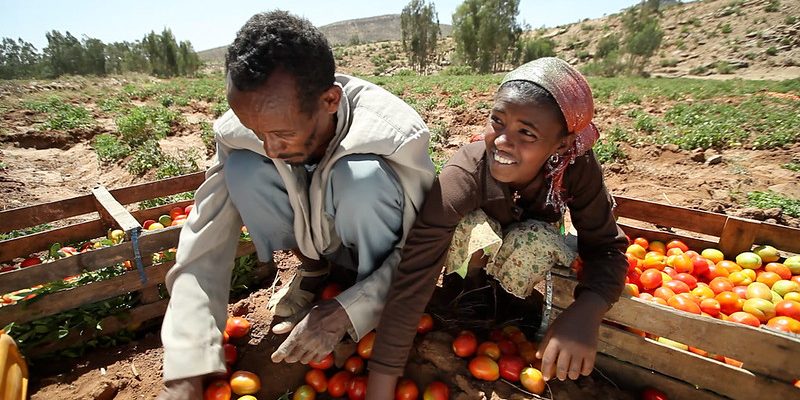Photo: Stephan Bachenheimer / World Bank
Story Highlights
- The Agricultural Growth Project is promoting and expanding alternative source of water as part of solving the problems of farmers in areas with low rains and affected by recurrent droughts as result of climate change.
- The project promotes different improved of seeds, providing technical trainings and expertise support to boost productivity
- Sector office are coordinating and collaborating to support farmers in solving their challenges and capacitating cooperatives to challenges they face in the production process.
Malika Ahmed, 34, with her husband and two children are residents of Genderige kebele in Dire Dawa City Administration rural area. She is founder and member of Hamiliton Fruit and Vegetable Production and Horticulture Seedling Suppliers Farmers Cooperative. Her family is among the millions of smallholder farmers benefiting from the World Bank-funded Second Agricultural Growth Project (AGP-II).
The Genderige kebele is known for its production of fruits and vegetables and export to foreign markets like Djibouti, and Somalia. However, the area has been impacted by climate change and recurrent drought since 2005 which results in sharp decline in production of fruits and vegetables which pushes the residents into poverty. Hamilton Fruit and Vegetable producer’s farmers’ cooperative was established five years ago, led by the strong and hardworking female farmer, Malika Ahmed to overcome this challenge in the area.
Malika, who has an eight grade education said, her better education status than her fellow farmers, press her to feel responsible to attempt to solve her and the neighboring farmers’ common challenge of access to water and improve technical know how to improve their productivity and production. She thought collecting voice and resource will help to be heard and to get necessary supports to overcome their challenges, achieve result. Malika along with the sector office support, established a cooperative five years ago with 8 female and 17 male farmer members. She serves as chairperson and assumes extra engagement in the cooperative to take care the cooperative work and external relation with different sector office and institutions.
The cooperative owns 25 hectares of agricultural land and producing Orange, Tomato, Onion, Pepper etc. Their land was covered with 21 hectare is planted with orange and few trees of mango and the remaining 4 hectare sorghum. Two shallow wells constructed with member own contributions were not enough to realize the cooperative vision to produce in better capacity. Currently due to water shortage, the cooperative is farming only 11 hectares of the land. Lack of electricity, high cost of fuel, lack of supply of improved seeds, shortage of water; reduction of pepper production due to fungi disease are the main challenges for Hamilton Farmers’ Cooperative in the production process that limits their capacity. With the supports of Bureau of Agriculture, Water and Sewerage and Mines and Energy the cooperative is able to have the drilling of a 175 meter deep water well, the supply of generators, improved seeds, technical training and expertise support.
Before the area was dry and the farmers including her were not able to get enough water to produce according to Malika. Malika said “now the Leaves can witness the change we are having , Alhamdulillah! Currently, with the available water for the farming and the technical support provided, they are able to produce on 11 hectares. In 2021/22 production season, per hectare on average 1500 quintal Orange; 400 quintal Tomato; 320 quintal Onion and 150 quintals of pepper were produced and sold to Addis Ababa and Djibouti traders. The members of the cooperative were benefited by earning a total of more than 5.4 M ETB revenue , out of which 2.1 M is net-profit. Malika indicted has it been their cooperative gets access to the electric grid which would help to cut their huge daily cost on fuel for generator and improve their water access, their profit would have been better. From the earnings she is be able to send her two children to better school. Three of the cooperative members are able to purchase a Force vehicle( Small vehicles/Bajaji) and five members, including Malika , were able to buy residential place to live in the town through the income they generate along with the rest of the cooperative members. Malika further indicated the cooperative is also creating job and workers are also attending their education to earn their degree while working in the farm.
Over the next five years, the members by increasing the savings capacity of the association, and increase production using improved seeds, improving access to water , they would like to supply products directly to consumers, produce fruit and vegetable seedlings in a greenhouse to supply for local community with affordable price, and engaging in long-term agricultural industrialization to export tomatoes paste and orange juice to local and foreign markets and get 2M ETB net profit for each of them. The cooperative experience shows that expanding alternative source of water for areas with low rains and affected by frequent droughts, access to improved seed Varieties’ and technical support coupled with farmers own commitment with strong women leadership , farmers can solve their challenges and better results can be achieved.
Genderige kebele of Dir Dawa City Administration is one of the 4,107 kebeles benefiting from the Second Agricultural Growth Project (AGP2). The project is financed by multiple donors including the World Bank, the European Union, Global Affairs Canada, the Italian Development Cooperation, the Royal Netherlands Embassy, the Spanish Development Cooperation, the United States Agency for International Development and Food and Agricultural Organization of the United Nations.




